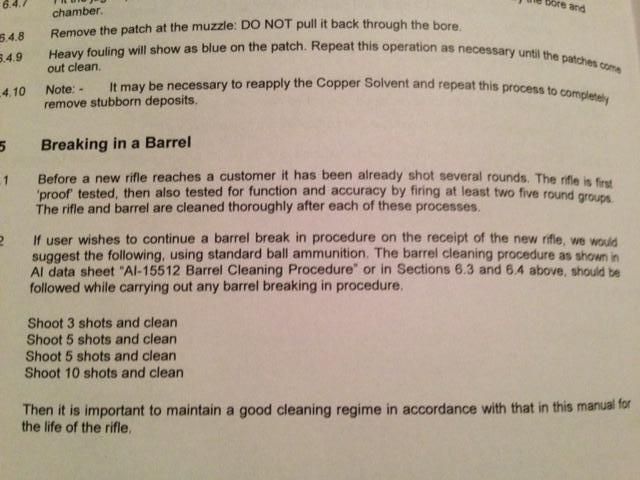No, cause you are talking like you have a clue.
Let me repeat this,
I took a Robert Gradous Gunsmithing Class, where I brought my parts and in 4 days built a custom rifle. I used a Custom Bartlein Barrel. Most important part of this story, I have no prior machining skills and I was the one who chambered this rifle / barrel. A custom hand lapped barrel... so no break in should be necessary, according to the experts here.
Well, I have no clue on the speed of which I am supposed to operate these tools, but I chambered it and I am sure, I messed it up. (Robert keeps two barrels on hand expecting you mess one up)
When it came time to shoot this rifle, we had to excessively break it in. Like a 125 rounds worth, as it was fouling and not shooting as it should. After about 125 rounds of shooting it, it began to fall in line with what it should do, and today the rifle is outstanding in all areas. Including fouling. It's easy to work with.
I did it, and I had no idea.
Rewind to a pair of factory TRG-22s, I broke in one and just shot the other. You cannot tell them apart, both perform in a identical manner. Factory Hammer Forged Barrels... which according to the experts needs break in.
I do not break in factory AIs, the same as my custom GAPs.
I will go get a factory 700 in 300WM after SHOT and prove you don't need to break them in, that shooting accomplishes the same thing.
Let me repeat this,
I took a Robert Gradous Gunsmithing Class, where I brought my parts and in 4 days built a custom rifle. I used a Custom Bartlein Barrel. Most important part of this story, I have no prior machining skills and I was the one who chambered this rifle / barrel. A custom hand lapped barrel... so no break in should be necessary, according to the experts here.
Well, I have no clue on the speed of which I am supposed to operate these tools, but I chambered it and I am sure, I messed it up. (Robert keeps two barrels on hand expecting you mess one up)
When it came time to shoot this rifle, we had to excessively break it in. Like a 125 rounds worth, as it was fouling and not shooting as it should. After about 125 rounds of shooting it, it began to fall in line with what it should do, and today the rifle is outstanding in all areas. Including fouling. It's easy to work with.
I did it, and I had no idea.
Rewind to a pair of factory TRG-22s, I broke in one and just shot the other. You cannot tell them apart, both perform in a identical manner. Factory Hammer Forged Barrels... which according to the experts needs break in.
I do not break in factory AIs, the same as my custom GAPs.
I will go get a factory 700 in 300WM after SHOT and prove you don't need to break them in, that shooting accomplishes the same thing.



